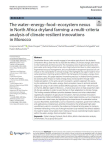Kertolli E., Prosperi P., Harbouze R., Moussadek R., Echchgadda G., Belhouchette H. (2024). The water-energy-food-ecosystem nexus in North Africa dryland farming: a multi-criteria analysis of climate-resilient innovations in Morocco. Agricultural and Food Economics, 01/12/2024, vol. 12, p. 34.
https://doi.org/10.1186/s40100-024-00327-5
https://doi.org/10.1186/s40100-024-00327-5
| Titre : | The water-energy-food-ecosystem nexus in North Africa dryland farming: a multi-criteria analysis of climate-resilient innovations in Morocco (2024) |
| Auteurs : | E. Kertolli ; P. Prosperi ; R. Harbouze ; R. Moussadek ; G. Echchgadda ; H. Belhouchette |
| Type de document : | Article |
| Dans : | Agricultural and Food Economics (vol. 12, Décembre 2024) |
| Article en page(s) : | p. 34 |
| Note générale : | ClimBeR CGIAR initiative on climate resilience |
| Langues : | Anglais |
| Langues du résumé : | Anglais |
| Catégories : |
Catégories principales 07 - ENVIRONNEMENT ; 7.5 - Dégradation : Impact, DésertificationThésaurus IAMM PETITE EXPLOITATION AGRICOLE ; SYSTEME DE PRODUCTION ; INNOVATION ; ZONE ARIDE ; CHANGEMENT CLIMATIQUE ; ECOSYSTEME ; RESSOURCE EN EAU ; RESSOURCE ALIMENTAIRE ; RESSOURCE ENERGETIQUE ; DISCUSSION DE GROUPE ; ANALYSE DE SYSTEME ; ANALYSE MULTICRITERE ; PARTICIPATION ; PARTIE INTERESSEE ; NIVEAU LOCAL ; MAROC |
| Résumé : | Smallholder farmers, who mostly engage in low-value agriculture in the drylands of Northern Africa, were the first to have felt the effects of climate change, with threats to their livelihoods and food security. The increasing costs of agricultural production, poor water and energy infrastructure, loss of agricultural land due to urban expansion, fragmented resource management, and unsustainable management practices all contribute to this vulnerability to climate change. This highlights the urgent need for innovative practices in farming systems. Within the framework of the water–energy–food–ecosystem nexus, this paper explores innovative practices in dryland farming systems, by assessing their impact on water, energy, food, and ecosystem through stakeholder perception. In this work, we aim to present a systems approach for assessing the resilience of the water–energy–food–ecosystem nexus in arid and semiarid regions. By using a multi-criteria analysis (MCA) approach, the study—which focuses on the Fès–Meknès region in Morocco—involves local actors to help researchers identify the key variables in order to assist farmers in their adaptation to climate change. The findings revealed different priorities between farmers and other stakeholders regarding the adoption of agricultural innovations. Farmers prioritize innovations that guarantee higher profitability and more market opportunities, such as integrating olive trees with cereal crops, by highlighting the importance of sustainable income sources. Meanwhile, stakeholders, such as researchers, engineers, government officials, and agribusiness entrepreneurs, prioritize innovations that emphasize high water use efficiency, which is crucial for the resilience of dryland farming areas: for instance, rainwater harvesting or the use of drought-resistant crop varieties that directly address the need for water conservation. But in doing so they are overlooking broader aspects within the water–energy–food–ecosystem nexus. |
| Note de contenu : | Licence CC BY 4.0 |
| Cote : | Online |
| URL / DOI : | https://doi.org/10.1186/s40100-024-00327-5 |
Documents numériques (1)
PRO52179.pdf Adobe Acrobat PDF |







